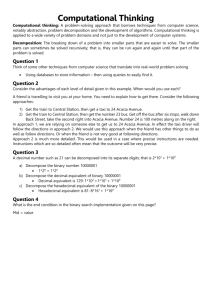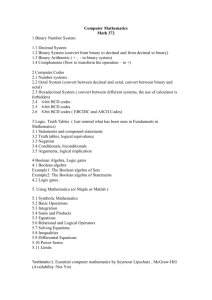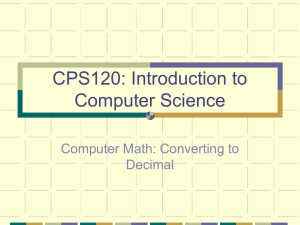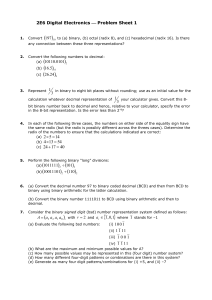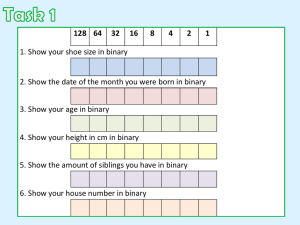number system assignment2013
advertisement
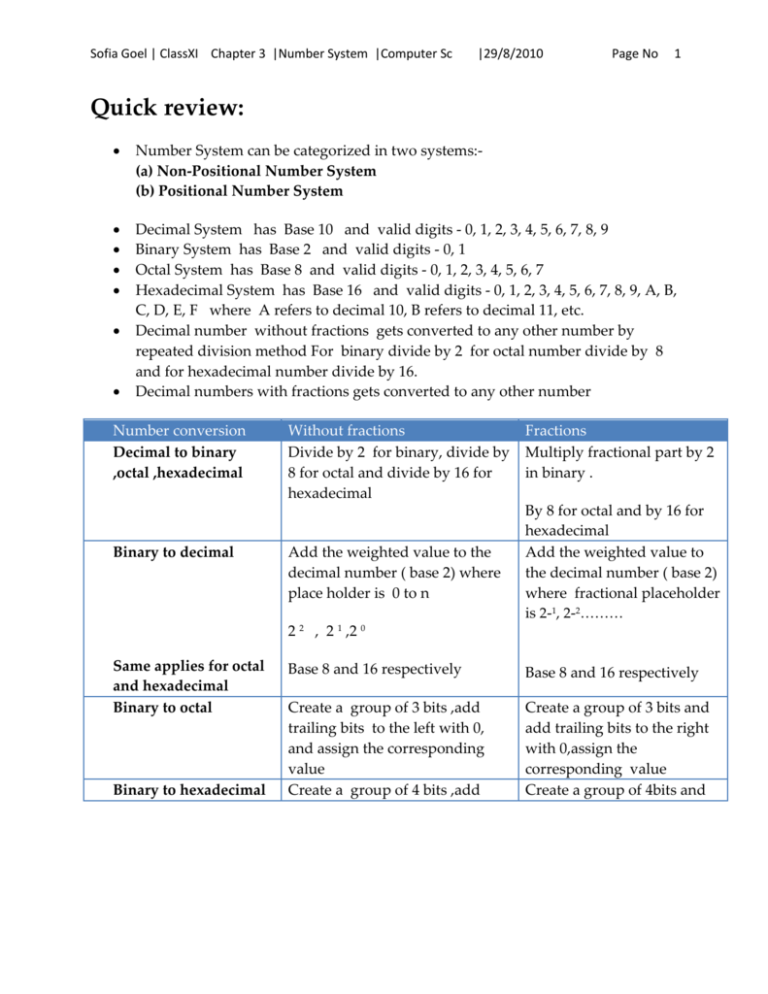
Sofia Goel | ClassXI Chapter 3 |Number System |Computer Sc |29/8/2010 Page No 1 Quick review: Number System can be categorized in two systems:(a) Non-Positional Number System (b) Positional Number System Decimal System has Base 10 and valid digits - 0, 1, 2, 3, 4, 5, 6, 7, 8, 9 Binary System has Base 2 and valid digits - 0, 1 Octal System has Base 8 and valid digits - 0, 1, 2, 3, 4, 5, 6, 7 Hexadecimal System has Base 16 and valid digits - 0, 1, 2, 3, 4, 5, 6, 7, 8, 9, A, B, C, D, E, F where A refers to decimal 10, B refers to decimal 11, etc. Decimal number without fractions gets converted to any other number by repeated division method For binary divide by 2 for octal number divide by 8 and for hexadecimal number divide by 16. Decimal numbers with fractions gets converted to any other number Number conversion Decimal to binary ,octal ,hexadecimal Binary to decimal Without fractions Divide by 2 for binary, divide by 8 for octal and divide by 16 for hexadecimal Add the weighted value to the decimal number ( base 2) where place holder is 0 to n Fractions Multiply fractional part by 2 in binary . By 8 for octal and by 16 for hexadecimal Add the weighted value to the decimal number ( base 2) where fractional placeholder is 2-1, 2-2……… 2 2 , 2 1 ,2 0 Same applies for octal and hexadecimal Binary to octal Binary to hexadecimal Base 8 and 16 respectively Base 8 and 16 respectively Create a group of 3 bits ,add trailing bits to the left with 0, and assign the corresponding value Create a group of 4 bits ,add Create a group of 3 bits and add trailing bits to the right with 0,assign the corresponding value Create a group of 4bits and Sofia Goel | ClassXI Chapter 3 |Number System |Computer Sc |29/8/2010 trailing bits to the left with 0 Octal and hexadecimal to binary Octal to hexadecimal Hexadecimal to octal Binary 0000 0001 0010 0011 0100 0101 0110 0111 1000 1001 1010 1011 1100 1101 1110 1111 Hex 0 1 2 3 4 5 6 7 8 9 A B C D E F Same as for integers Same as for integers Binary Octal 000 001 010 011 100 101 110 111 0 1 2 3 4 5 6 7 Multiple Choice Questions : 1. Conversion of decimal number 6110 to its binary number equivalent is b.1111002 c. 1100112 e. None of the above d. 0011012 2 add trailing bits to the right with 0 Write binary equivalent of each digit after decimal point towards right Write binary equivalent of each digit towards left. (For octal form group of3bits and for hexadecimal in 4bits) First convert octal to binary then binary to hexadecimal First convert hexadecimal to binary then binary to octal a. 1100012 Page No Sofia Goel | ClassXI Chapter 3 |Number System |Computer Sc 2. Conversion of decimal number 9910 to its binary number equivalent is a. 11000112 c. 1111012 3. |29/8/2010 b.110011102 d. 111112 e. None of the above Conversion of decimal number 7110 to its binary number equivalent is a. 1100112 b.11100112 c. 01100112 d. 10001112 e. None of the above 4. Conversion of decimal number 8910 to its binary number equivalent is a. 10110112 b.11001112 c. 10110012 d. 100112 e. None of the above 5. Conversion of decimal number 1310 to its octal number equivalent i a. 158 b.178 c. 138 e. None of the above d. 118 6. Conversion of decimal number 4210 to its octal number equivalent is a. 578 b.428 c. 478 d. 528 e. None of the above 7. Conversion of decimal number 6710 to its octal number equivalent is a. 1008 b.1038 c. 1098 e. None of the above d. 998 8. Conversion of an octal number 31378 to its decimal equivalent is a. 163110 b.163210 c. 153110 d. 193110 e. None of the above Page No 3 Sofia Goel | ClassXI Chapter 3 |Number System |Computer Sc |29/8/2010 9. Conversion of an octal number 1348 to a binary number is a. 0010110112 b.0011011002 c. 0010111002 d. 1100112 e. None of the above 10. Conversion of an octal number 74328 to a binary number is a. 11110001101112 b.1111000110102 c. 1100110101112 d. 1111111110002 e. None of the above 11. Conversion of hexadecimal number ID7F16 to a decimal number is a. 755110 b.877110 c. 555710 e. None of the above d. 778110 12. Conversion of hexadecimal number 6B216 to its binary number equivalent is a. 11110001101112 b.0110101100102 c. 01100110011112 d. 111111112 e. None of the above 13. Conversion of binary number 11000112 to an octal number is a. 1408 b.1438 c. 1478 e. None of the above d. 1498 14. Conversion of binary number 10100002 to an octal number is a. 1198 b.1018 c. 1118 d. 1208 e. None of the above 15. Conversion of binary number 1011102 to hexadecimal is Page No 4 Sofia Goel | ClassXI Chapter 3 |Number System |Computer Sc a. 358 b.468 c. 568 d. 508 e. None of the above 16. Conversion of binary number 11000112 to hexadecimal is a. 6316 b.5716 c. 4616 e. None of the above d. 4016 17. Conversion of a hexadecimal number 4E16 to binary number is a. 10011012 b.10011102 c. 11011002 d. 1101112 e. None of the above 18. Conversion of a hexadecimal number 3A16 to binary number is a. 11011012 b.1110102 c. 1001102 d. 1100112 e. None of the above 19. Conversion of a octal number 638 to its decimal number is a. 5110 b. 6110 c. 5710 d. 5310 e. None of the above 20. Conversion of an octal number 1438 to its decimal number is a. 9010 b. 97110 c. 9910 d. 10710 e. None of the above 21. Conversion of an octal number 1258 to its decimal number is |29/8/2010 Page No 5 Sofia Goel | ClassXI Chapter 3 |Number System |Computer Sc a. 9010 b. 8510 c. 8710 d. 9910 e. None of the above 22. Conversion of an octal number 1368 to hexadecimal number is a. 7E16 c. 5A16 b. 5E16 d. 5D16 e. None of the above 23. Conversion of an octal number 1128 to hexadecimal number is a. 4A16 b. 5A16 c. 1516 e. None of the above d. 2016 24. Conversion of an octal number 568 hexadecimal number is a. 2A16 b. 3A16 c. 2E16 d. F16 e. None of the above 25. Conversion of an octal number 208 to its binary number is a. 1000010 b.1011110 c. 1011016 e. None of the above d. 1111016 26. Addition of 1101012 and 1011112 is a. 11001002 b.11010002 |29/8/2010 Page No 6 Sofia Goel | ClassXI Chapter 3 |Number System |Computer Sc c. 11101112 |29/8/2010 d. 1100112 e. None of the above 27. Addition of 1101011012, 1110111012, 0001111112, 1001011012, 1111101112 is a. 1011010111010 2 b.11110110000102 c. 1000101000101 2 e. None of the above d.010010000000102 28. Subtraction of 1001011002 from 11101010102 is a. 10010111102 b.01101000012 c. 11110000012 e. None of the above d. 11110111112 29. Addition of 102 and 112 is a. 1002 b. 1012 c. 1112 d. 1102 e. None of the above 30. Addition of 11012 and 10102 is a. 101112 b. 110002 c. 110112 d. 101112 e. None of the above Answers: Page No 7 Sofia Goel | ClassXI Chapter 3 |Number System |Computer Sc 1) |29/8/2010 Page No 8 a 2) a 3) d 4) c 5) a 6) d 7) b 8) a 9) c 10) b. 11) a 12) b. 13) b. 14) d 15) c 16) a 17) b 18) b 19) a 20) c. 21) b 22) b 23) b 24) c 25) a. 26) a 27) a 28)a 29) b 30) b Solved Exercises: 1. Define the following terms: a. Byte b) unicode a) Byte: A group of 8 bits is referred to as a byte. b) Unicode :A symbol encoding system that uses 16 bits to represent of all world languages. It can represent about 65536 symbols. Similar to ASCII, each symbol is assigned a (16-bit) numerical code. 2. A: What is the importance of binary number system in building computers ? A computer can represent information as electrical pulses or magnetic fields. A computer uses and works with two voltage states: high or low (to represent one bit of information). As such it makes sense to use a number system that also just uses two possible states: 1 or 0 (On or off). 3. Explain why the computer must convert between the decimal and binary systems? (Why can’t it just store decimal numbers, for example?) A: The computer cannot and doesn’t store decimal numbers directly. As stated above it can only store and transmit electrical pulses (high or low). As such decimal numbers must be converted into a sequence of 1’s and 0’s, which can then easily be translated into high or low voltages. 4. How many distinct values can we represent with a) 4 bits b) 5 bits A: a) 24 =16 b) 25 = 32 Sofia Goel | ClassXI Chapter 3 |Number System |Computer Sc 5. A: |29/8/2010 Page No 9 What is the largest positive number one can represent in 5-bit 2’s complement code? 25-1 -1 = 15 6. What is the largest number that can be represented if we use 6 bits? Show your work / reasoning. A: We get the largest number by using all bits (digits). For 6 digits, the number in binary will be 11 1111. In decimal, 11 1112 = 32 +16+ 8+4+2+1 = 6310 7. We could use the most significant digit to represent the sign of a number. If it is 1, the number is negative. Otherwise, it is positive. What problems do we run into if we use this system? A: The problem is that the arithmetic (addition and subtraction) doesn’t give reasonable results. This can be illustrated with the following example. Suppose we represent 5 and –5 using this scheme. Then, 510 = 0000 01012 and -510 = 1000 01012 Now we know that 5 + (-5) = 0 and 010 = 0000 00002 But, when we add 0000 01012 and 1000 01012 together, we do not get 010 as expected! 0000 01012 + 1000 01012 -----------------1000 10102 = -1010 8. What is the general technique for converting a decimal number to binary? A: The general technique for converting a decimal number to binary involves repeatedly dividing the decimal number by 2 and then collecting the reminders to form the binary answer. The steps are as follows: i. ii. Divide the decimal number by 2. Working from right to left, use the remainder as the next digit of your binary answer. Sofia Goel | ClassXI Chapter 3 |Number System |Computer Sc iii. |29/8/2010 Page No 10 Use the quotient from your previous division to repeat steps 1 and 2 until you get zero for a quotient. 9. Which digit is the least significant digit of a number? Which digit is the most significant digit of a number? A: The rightmost digit is the least significant digit of a number, and the leftmost digit is the most significant digit of a number. For example, in the number 2045.9610 the least significant digit is 6 and the most significant digit is 2. 10. When converting a decimal number to binary with repeated division, does the remainder from your first division represent the least significant digit of your answer or the most significant digit of your answer? A: The remainder from your first division represents the least significant digit of your binary answer. When you convert integers from decimal to binary, you work from the least significant digit to the most significant digit (i.e. right to left). 11. A: Convert the decimal numbers 0 - 15 to binary and list the answers in a table beside their decimal equivalents. You should become familiar with these numbers so that you do not need to use repeated division when you need to write the binary. The table below lists the the numbers 0 - 15 in binary and decimal. B D B D B D B D 0000 0001 0010 0011 0 1 2 3 0100 0101 0110 0111 4 5 6 7 1000 1001 1010 1011 8 9 10 11 1100 1101 1110 1111 12 13 14 15 12. Come up with a scheme that will allow us to represent fractions in binary (e.g. 2.5, 3.75) A: Method 1: Use half of the bits to represent the number left of the decimal point and the other half to represent the fractional part. Sofia Goel | ClassXI Chapter 3 |Number System |Computer Sc |29/8/2010 Page No 11 Example: (Using 8 bits in total; 4 right most for fractional part) 8.2 = 1000 0010 Method 2: For binary numbers, the position of the digit corresponds to a power of 2. So, we could use negative powers of 2 to represent the fractional parts. Just as above, only some of the bits will be used for the fractional part. Example: (Using 8 bits in total; 4 right most for fractional part) 1011.0111 = 23 + 21 + 20 + 2-2 + 2-3 + 2-4 = 8 + 2 + 1 + 0.25 + 0.125 + 0.0625 = 11.4375 When converting from decimal to binary, a fraction will have to be represented as sum of negative powers of 2 (1/2, 1/4, 1/8, 1/16,…). Method3: Write the number in a modified scientific form such that the digit to the left of the decimal point is always 0 i.e. 34.619 becomes 0.34619 x 102. Now we could use some of the bits to represent the number right of the decimal point and rest of the digits to represent the exponent of 10. 13. Convert the following signed numbers from decimal to binary. You may only use 8 bits. A: Sofia Goel | ClassXI Chapter 3 |Number System |Computer Sc |29/8/2010 14. Convert the following decimal numbers to binary: a) 27 b) 75 c)164 d) 255 e) 94 A: a) 27 2 2 2 2 2 27 13 6 3 1 Remainder 1 (LSB) 1 0 1 1 1 0 1 1 Page No 12 Sofia Goel | ClassXI Chapter 3 |Number System |Computer Sc 0 1(MSB) Thus (27)10 = (11011)2 b) A: 75 2 2 2 2 2 2 2 75 37 18 9 4 2 1 0 Remainder 1 (LSB) 1 0 1 0 0 1(MSB) thus (75)10 = (1001011)2 c) 164 A: 2 2 2 2 2 164 82 41 20 10 Remainder 0 (LSB) 0 1 0 |29/8/2010 Page No 13 Sofia Goel | ClassXI Chapter 3 |Number System |Computer Sc 2 2 2 Thus 5 2 1 0 0 1 0 1(MSB) (164)10 = (10100100)2 d) 255 A: 2 2 2 2 2 2 2 2 255 127 63 31 15 7 3 1 0 Remainder 1 (LSB) 1 1 1 1 1 1 1(MSB) Thus (255)10 = (11111111)2 |29/8/2010 Page No 14 Sofia Goel | ClassXI Chapter 3 |Number System |Computer Sc e) 94 2 2 2 2 2 2 2 94 47 23 11 5 2 1 0 Remainder 0 (LSB) 1 1 1 1 0 1(MSB) Thus (94)10 = (1011110)2 15. Convert the following binary numbers to decimal: a) 1 b) 1010 A: a) 1x20 b) 1010 c)11001 d) 10000 = (1)10 = 1x23 + 0x22 + 1x21 + 0x20 = 8 + 0 + 2+ 0 = (10)10 c) 11001 = 1x24 + 1x23 + 0x22 + 0x21 + 1x20 = 16+ 8 +1 = (25 )10 d) 10000 = 1x24 + 0x23 + 0x22 + 0x21 + 0x20 |29/8/2010 Page No 15 Sofia Goel | ClassXI Chapter 3 |Number System |Computer Sc = = |29/8/2010 Page No 16 16+ 0 +0 +0 +0 (16 )10 16. Convert the following decimal fractions into binary . a. 68.5625 b. 43.625 A: a. 68.5625 First solve the integer part by repeated division method and then solve the fraction part by multiplication method . Solving 68 2 2 2 2 2 2 2 68 34 17 8 4 2 1 0 Remainder 0 (LSB) 0 1 0 0 0 1(MSB) it is 1000100 Now solving 0.5625 0.5625 x 2 = 1.125 0.125 x 2 = 0.25 0.25 x 2 = 0.50 0.50 x 2 = 1.00 Integer part 1 0 0 1 it is 1001 Adding both the values : (68.5625)10 = (1000100.1001)2 Sofia Goel | ClassXI Chapter 3 |Number System |Computer Sc |29/8/2010 43.625 b) A: Solving 43 2 2 2 2 2 2 43 21 10 5 2 1 0 Remainder 1 (LSB) 1 0 1 0 1(MSB) it is 101011 Now solving 0.625 Integer part 0.625 x 2 = 1.25 1 0.25 x 2 = 0.50 0.50 x 2 = 1.00 1 0 it is 101 Adding both the values : (43.625)10 = (101011.101)2 17. Convert the following binary fractions into decimal a) 00111011.01 b) 1110.001 A: 111011.01 is represented as = 1x25 + 1x24 + 1x23 + 0x22 + 1x21 +1x20 + 0x2-1 + 1x2-2 Page No 17 Sofia Goel | ClassXI Chapter 3 |Number System |Computer Sc |29/8/2010 Page No 18 = 32+ 16+ 8 + 2+1+ 0.25 = (59.25)10 1110.001 A: = 1x23 + 1x22 + 1x21 +0x20 + 0x2-1 + 0x2-2 + 1x2-3 b) = 8+ 4+ 2+ 0.125 = (14.125)10 Express the hexadecimal unsigned integer 5C with the equivalent decimal number 18. A : To express the hexadecimal unsigned integer 5C with the equivalent decimal number, we must convert the hexadecimal digits to decimal numbers as well as expand: 5C = 5(161) + 12(160) = 5 (16) + 12 (1) = 92 19. Convert 3724 8 into binary number A: 3724 8 (Write 3 bit binary form for every digit) = 3 7 2 4 011 111 010 100 = 11111 0101 2 20. Convert (100100101011)2 to octal A: 1) Write down your binary number: 100100101011 2) Divide your binary number into groups of 3 bits Sofia Goel | ClassXI Chapter 3 |Number System |Computer Sc |29/8/2010 (if you have an amount of bits that is not evenly divisible by 3 you add 0 bits onto the left side.) 100 100 101 011 3) Convert each group into a octal digit using this formula: 100, 100 ,101, 011 4 4 5 3 Thus 100100101011(2) = 4453(8) 21. convert (632)8 to decimal A: = (6 x 82) + (3 x 81) + (2 x 80) = (6 x 64) + (3 x 8) + (2 x 1) = 384 + 24 + 2 = (410)10 22. convert (177)10 to octal A: 8 8 8 177 22 2 Remainder 1 (LSB) 6 2(MSB) =261 23. convert (F4C)16 to decimal = (F x 162) + (4 x 161) + (C x 160) = (15 x 256) + (4 x 16) + (12 x 1) = (61516)10 24. Convert the following numbers from decimal to hexadecimal (use any methods). Show all steps. a. (4768)10 to hex. Page No 19 Sofia Goel | ClassXI Chapter 3 |Number System |Computer Sc |29/8/2010 A 16 16 16 16 4768 298 18 1 0 Remainder 0 (LSB) 10 (10=A) 2 1(MSB) Hence (4768)10 = 1 2 A 0 b) A: (159)10 16 16 159 9 Remainder 15(15 =F) 9 Hence (159)10 = 9F16 c) 215 A 16 16 215 13 Remainder 7 13 ( 13=D) Hence (215)10 = D716 25. Convert the following numbers from binary to hexadecimal. a) 0111 11012 A: 01112 = 7 11012 = 13 (D) Page No 20 Sofia Goel | ClassXI Chapter 3 |Number System |Computer Sc |29/8/2010 Page No 21 Hence 0111 11012 = 7D16 b) 1011 01012 A: 10112 = 1110 (B) 01012 = 5 Hence 1011 01012 = B5 26. Convert (6438)8 to base 10. A: 6438 = 6 * 82 + 4 * 81 + 3 * 80 = 6 * 64 + 4 * 8 + 3 * 1 = 384 + 32 + 3 = 419 in base 10 27. Convert hexadecimal (base-16) 1EA to base 10. Here we know what the letters A through F in base 16 represent. A represents 10, B represents 11, C is 12, D is 13, E is 14 and F is 15. With that in mind, we have 1EA16 = 1 * 162 + 14 * 161 + 10 * 160 = 1 * 256 + 14 * 16 + 10 * 1 = 256 + 224 + 10 = 490 in base 10 28. Convert hexadecimal F8 to binary . A: To convert hexadecimal F8 to binary, write down the binary for F first, then the binary for 8. F 8 1111 1000 Hence F8 = 11111000. 29. Convert hex number 1 A to binary A Hence Convert hex number 1A to binary. 1 A 0001 1010 1A = 0001 1010 Sofia Goel | ClassXI Chapter 3 |Number System |Computer Sc |29/8/2010 Page No 30. Convert the following from 2’s complement to Decimal 1010 A: This is a negative number as the most significant bit is 1. Find out its positive counter by flipping all bits and then adding 1. 0101 + 1 = 0110 = 0 x 23 + 1 x 22 + 1 x 21 + 0 x 20 =4+2=6 Hence the number is -6. 31. Convert the following numbers to their binary equivalents. a. 2710 b. 3310 c. 5410 d. 4710 e. 7810 A The decimal and binary equivalents are listed below. a. b. c. d. e. 2710 3310 5410 4710 7810 = = = = = 110112 1000012 1101102 1011112 10011102 32. Convert the following numbers to their binary equivalents. a. 13010 b. 20010 c. 54910 d. 30410 e. 101010 A: The decimal and binary equivalents are listed below. a. 13010 = 100000102 b. 20010 = 110010002 22 Sofia Goel | ClassXI Chapter 3 |Number System |Computer Sc |29/8/2010 Page No 23 c. 54910 = 10001001012 d. 30410 = 1001100002 e. 101010 = 11111100102 33. Convert the following numbers from decimal to binary. Assume we are using 8 bits to represent signed numbers. Show all steps. [Use 2’s complement in both cases.] a) -104 b) -49 A: 104 = 64 + 32 + 8 = 26+25+23 = 0110 10002 1’s Complement: 1001 01112 +0000 00012 2’s Complement: 1001 10002 Hence –104 = 1001 10002 b) -49 49 = 32 + 16 + 1 = 25+24+20 = 0011 00012 1’s Complement: 1100 11102 +0000 00012 2’s Complement: 1100 11112 Hence –49 = 1100 11112 34. Briefly describe the ASCII system and explain how it works(ie. How is it used to represent data). A: The ASCII system was devised in 1960s. In this system 128 symbols including the alphabet letters, digits, and punctuation marks are assigned a unique decimal code from 0 to 127. As such these symbols can be represented as a sequence of 7 bits on the computer. 35. Give the decimal equivalent of the following symbols (characters) in ASCII? Sofia Goel | ClassXI Chapter 3 |Number System |Computer Sc A: M = 65+12 = 77 (13th letter) d = 97+3 = 100 |29/8/2010 Page No 24 7 = 48+7 = 55 36. Explain how you did the conversion in Question 32 A: M is the 12th letter after ‘A’ so add 12 to the ASCII code for A. Similarly, d is the 3rd letter after a so add 3 to ASCII code for a. ASCII code for 48 is 0 so add 6 to it to get the code for 7. 37. Use ASCII conversion to decode the following message from binary to text. Show all your steps and explanations. 0100 10002 0110 10012 A: 0100 10002 = 64 + 8 = 65 + 7 = ‘H’ 0110 10012 = 64 + 32+8+1 = 105 = 97 + 8 = ‘i’ Decoded message = Hi 38. Represent the word “ COMPUTER “ in ASCII code assuming odd parity is being followed for transmission of strings from one device to another . A To Convert the string into ASCII refer to the table provided for ASCII codes. mapping the various characters with the ASCII code the following representation is given below: According to that Character C O M P U T E R 39. Parity Bit 0 0 1 1 1 0 0 0 ASCII code 1000011 1001111 1001101 1010000 1010101 1010100 1000101 1010010 . Add the following unsigned binary numbers a) 1110 + 111 b) 11011 + 11011 Sofia Goel | ClassXI Chapter 3 |Number System |Computer Sc A: a) 1110 0111 10101 b) 11011 11011 110110 40. Fill in the blanks : a.) Convert 110111.1101 binary b.) 10010101.111 binary decimal _________________ c.) Convert 11000011.01 binary decimal _________________ e) Convert 38.4 decimal binary _________________ A: a) Convert 110111.1101 binary decimal 55.8125 |29/8/2010 decimal __________________ d.) 11001010.001 binary decimal __________________ f) 252.33 decimal binary ___________________ b) 10010101.111 binary decimal 149.875 Page No 25 Sofia Goel | ClassXI Chapter 3 |Number System |Computer Sc c) Convert 11000011.01 binary d) decimal 195.25 e) |29/8/2010 Page No 26 11001010.001 binary decimal 202.125 Convert 38.4 decimal binary 100110.0110011 f) 252.33 decimal binary 11111100.010101 41. Equate the following octal numbers to base 10 a. (5467)8 =____________ b.(6345)8 =___________ c. (76534)8 =___________ A: a) 2871 b) 3301 c) 32092 42. . Using an 8 bit word length, store the following decimal values as Sign Magnitude and 2's Complement: Sign Magnitude 1) -94 2) +110 2's Complement ________________ ________________ ________________ ________________ 3) -23 ________________ ________________ 4) +49 ________________ ________________ Using a 10 bit word length store following decimal values as Sign Magnitude and 2's Complement: Sofia Goel | ClassXI Chapter 3 |Number System |Computer Sc Sign Magnitude ________________ ________________ 6) -190 ________________ ________________ 8) +87 ________________ ________________ Page No 2's Complement 5) +278 7) -2 |29/8/2010 ________________ ________________ Convert following binary values to decimal assuming they are stored as Sign Magnitude & then as 2's Complement: 9) 1011 1011 Sign Magnitude 2's Complement ________________ ________________ 10) 0011 1101 ________________ ________________ 11) 1110 1101 ________________ ________________ 12) 0101 1000 ________________ ________________ 13) 0110 1101 0111 ________________ ________________ 14) 1011 0110 1101 ________________ ________________ 15) 0001 0110 1010 ________________ ________________ 16) 1111 1101 1011 ________________ ________________ A: Sign Magnitude 2's Complement 27 Sofia Goel | ClassXI Chapter 3 |Number System |Computer Sc 1. 1101 1110 1010 0010 2. 0110 1110 0110 1110 3. 1001 0111 1110 1001 4. 0011 0001 0011 0001 5. 01000 10110 01000 10110 6. 10101 11110 11010 00010 7. 10000 00010 11111 11110 8. 00010 10111 00010 10111 9. -59 -69 10. +61 +61 11. -109 -19 12. +88 +88 13. +1751 14. -877 -1171 15. +362 +362 16. -2011 -37 +1751 |29/8/2010 Page No 28 Sofia Goel | ClassXI Chapter 3 |Number System |Computer Sc |29/8/2010 Page No 43. Convert the following text into binary using ASCII. Show all your work (for each character). Base 16 A: B = 66 = 64 + 2 = 0100 00102 a = 97 = 64 + 32 + 1 = 0110 00012 s = 115 = 64 + 32 + 16 + 2 + 1 = 0111 00112 e = 101 = 64 + 32 + 4 + 1 = 0110 01012 = 32 = 0010 00002 1 = 49 = 32 + 16 + 1 = 0011 00012 (the character ‘1’ = 16) 6 = 54 = 32 + 16 + 4 + 2 = 0011 01102 So Base 16text = 0100 00102 0110 00012 0111 00112 0110 01012 0010 00002 0011 00012 11 02 44. Convert the following code from decimal to the equivalent character using ASCII. Show your work / reasoning. 11110 A: 11110 = 64 + 32 + 8 + 4 + 2 + 1 = 96 + 15 96 + 1 is the first letter of the alphabet (i.e. a)… so 96 + 15 is the 15th letter of the alphabet. 11110 in ASCII is o Very Short questions: 1. Convert the following decimal into binary a. 568.1875 ____________________ b. 6143.3175 _______________________ c. 35________________________ d. 76__________________ 29 Sofia Goel | ClassXI Chapter 3 |Number System |Computer Sc |29/8/2010 e. 109________________________ f. 111_____________________ 2. a. b. c. d. e. f. Convert the following binary into decimal 100111011.01 _________________ 11001110.1001 __________________ 00111111.1111 ___________________ 001000100101.1110 __________________ 11111000011.01 ___________________ 1000110111110.001 __________________ 3. Convert the following decimal into hexadecimal. a. 4096 __________ b. 314 _____________ c. 67 ____________ d. 56 _______________ e. 89______________ f. 12222__________________ 4. Convert the following hexadecimal numbers in decimal notation. a. E2_____________________ b. 987________________________ c. FFF_________________________ d. A4_________________________ e. CDD3_________________________ f. 4E8_________________________ 5. Convert the following binary numbers into hexadecimal a. b. (0110 1100 1001 0001)2 = ___________________ (0011 1010 1111 1110)2 = ___________________ c. (1010 1101 1011 1011)2 = ___________________ d. (0000 0000 1111 1111)2 = ____________________ e. (1010 0101 1110 0011)2 = ___________________ f. (0110 0111 0010 0000)2 = ____________________ g. (0110 1001)2 = _____________________________ h. (1010 0111)2 = _____________________________ Page No 30 Sofia Goel | ClassXI Chapter 3 |Number System |Computer Sc |29/8/2010 Page No 6. Convert the following octal numbers to their decimal equivalent: i. 36 ii. 426 iii. 108 iv. 17 v. 117 7. Find the i. ii. iii. iv. v. octal equivalent of the following binary numbers : 101110 1000100 111111 1000001 110000000100 8. Convert the following octal numbers to their equivalent binary numbers i. 23 ii. 123 iii. 46 iv. 89 v. 34 9. Convert the following decimal number into their octal and hexadecimal equivalent. i. 34 ii. 156 iii. 34.78 iv. 23.8999 v. 12.89 10. In the following problems, each bit pattern represents a value stored in two's complement notation. Perform each addition, and show the result in two's complement. Check your answers by translating each problem into decimal notation. a. 0101 +0010 b. 0011 +0001 c. 0101 +1010 d. 1110 +0011 e. 1010 +1110 31 Sofia Goel | ClassXI Chapter 3 |Number System |Computer Sc |29/8/2010 Page No 11. Solve each of the following problems in two's complement notation. Are any of the results incorrect due to overflow? a. 0101 +0011 b. 0101 +0110 c. 1010 +1111 d. 0010 +0101 12. Perform the following binary addition exercises: a. 1 1 0 1 1 1101 b. 100011 101101 c. 11101 11111 13. Find the 1’s and 2’s compliment of the following numbers : i. 65 ii. 45 iii. 92 iv. 101 v. 34 14. Find 2’s compliment of the following numbers : i. -89 ii. -67 iii. -45 iv. -13 v. -19 15. Which of the following are valid hexadecimal numbers? a. BAD b. DEAD c. CABBAGE d. ABBA e. 127 e. 0101 +1001 32 Sofia Goel | ClassXI Chapter 3 |Number System |Computer Sc Short Questions: 1. Convert the following binary numbers to decimal: a. 1101 b. 1 c. 101 d. 110 e. 10110 f. 0010110 g. 1101111 h. 11101110111 2. Convert the following decimal numbers to binary: a. 123 b. 242 c. 17 |29/8/2010 Page No 33 Sofia Goel | ClassXI Chapter 3 |Number System |Computer Sc |29/8/2010 d. 125 e. 10001 f. 99 g. 214 h. 78 3. Convert the following binary numbers to hexadecimal (base-16): a. 0111 b. 1101 c. 1011011 d. 11101100 e. 100101101 f. 0101101011110000 g. 00000000000000000001 h. 11001010111001101011010011 4. Convert the following hexadecimal numbers to binary: a. DEAD b. AF-05-12-57 Page No 34 Sofia Goel | ClassXI Chapter 3 |Number System |Computer Sc |29/8/2010 c. 00-00-0C-9F-F2-A9 d. 00-00-5E-00-00-00 e. 123456789ABCDEF f. F0E1D2C3B4A59687 g. B0C h. 1000 5. Convert the following hexadecimal numbers to decimal: a. AA b. 123F c. FEDCBA d. D0-BE-D0 e. B8C f. FF-FF-FF-FA g. 10 6. Convert the following decimal numbers to hexadecimal: a. 9 Page No 35 Sofia Goel | ClassXI Chapter 3 |Number System |Computer Sc |29/8/2010 b. 32 c. 73 d. 255 e. 1,025 f. 4,099 g. 65536 h. 1,048,575 7. Convert the following octal (base-8) numbers to decimal: a. 4 b. 10 c. 777 d. 05726 e. 183242 8. Convert the following decimal numbers to octal: a. 5 b. 9 c. 625 Page No 36 Sofia Goel | ClassXI Chapter 3 |Number System |Computer Sc |29/8/2010 d. 1,024 e. 32,767 9. Convert the following octal numbers to binary: a. 107 b. 2746 c. 000000001 d. 66542 e. 76543210 10. Convert the following binary numbers to octal: a. 110 b. 011101 c. 010101011 d. 1111011101101 e. 111110101100011010001 11. Convert the following octal numbers to hexadecimal: a. 6 Page No 37 Sofia Goel | ClassXI Chapter 3 |Number System |Computer Sc |29/8/2010 b. 12 c. 367 d. 5555 e. 123456 12. Convert the following hexadecimal numbers to octal: a. 2 b. 8 c. 10 d. FE e. 2A4F2D 13. Convert the following binary numbers to decimal : a. 0.1 b. 1.11 c. 101.01101 d. 100101.11101 e. 11101111.10000001 14. Convert the following decimal numbers to binary : Page No 38 Sofia Goel | ClassXI Chapter 3 |Number System |Computer Sc |29/8/2010 Page No 39 a. 0.5 b. 1.0625 c. 7.7500 d. 163.2 e. 3.141592654 Long Questions: 1. Explain the ways of representing negative integers in binary? 2. What do you understand by positional number system. 3. What are the ways of converting decimal number into binary ,octal and hexadecimal. 4. What do you understand by the term sign and magnitude. 5. What are the three things in representing floating point numbers in binary form. Give an example. 6. What is the advantage of 2 ‘s compliment over 1’s compliment . 7. How will you determine parity check for ASCII codes. 8. Write the steps for converting hexadecimal number to octal. 9. Write the steps for converting decimal number to binary using direct method. 10. What is repeated division method .Write down the steps for the same. 11. What is the importance of hexadecimal presentation of number in designing chips . 12. What do you understand by computer codes? 13. Write short notes on ASCII ,ISCII ,Unicode . 14. Convert the following decimal numbers to its binary equivalent. a) 25555.654 b) 45.662 c) 1.567 Sofia Goel | ClassXI Chapter 3 |Number System |Computer Sc |29/8/2010 d) 3.4562 e) 2.24 15. Convert the following binary numbers to its decimal equivalent. a) 100.1000 b) 10101.1000 c) 1111.001 d) 10.101 e) 11.001 16. Convert the following octal numbers to its decimal equivalent. a) 123.87 b) 34.78 c) 23.56 d) 12.66 e) 10.10 17. Convert the following decimal numbers to its octal equivalent. a) 100.1001 b) 10101.101 c) 1111.0011 d) 10.1011 e) 11.0011 18. Convert the following decimal numbers to its hexadecimal equivalent a) 167.100 b) 101012.13 c) 13.17 d) 1617.19 e) 18.13 19. Convert the following hexadecimal numbers to its binary equivalent a) 2DC.F b) 3E.D c) 4AA.B d) 5C.D Page No 40 Sofia Goel | ClassXI Chapter 3 |Number System |Computer Sc |29/8/2010 e) 1A.B 20. Convert the following binary numbers to its hexadecimal equivalent. a) 100.1001001 b) 10101.101001 c) 1111.001100 d) 10.10110001 e) 11.00110001 JIT Number Systems Exercise 1. Convert the following decimal numbers to binary: f) 14 ______________________ g) 189 ______________________ h) 257 ______________________ i) 472 ______________________ 21. Convert the following decimal numbers to hex: a) 14 ______________________ b) 189 ______________________ c) 257 ______________________ d) 472 ______________________ 3. Convert the following hex numbers to decimal: a) 0x37 ______________________ b) 0xAB ______________________ c) 0x0147 ______________________ d) 0x2AE1 ______________________ 4. Convert the following hex numbers to binary: a) 0x37 ______________________ b) 0xAB ______________________ c) 0x0147 ______________________ d) 0x2AE1 ______________________ 5. Convert the following binary numbers to hex: a) 0010 1101 ______________________ Page No 41 Sofia Goel | ClassXI Chapter 3 |Number System |Computer Sc b) 1010 1010 ______________________ c) 1110 0011 ______________________ d) 0010 1001 1011 0101 ______________________ 6. Convert the following binary numbers to decimal: a) 0010 1101 ______________________ b) 1010 1010 ______________________ c) 1110 0011 ______________________ d) 0010 1001 1011 0101 ______________________ |29/8/2010 Page No 42
